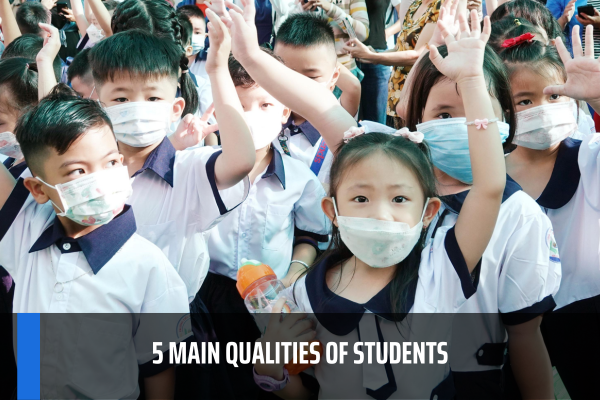What are the requirements to achieve the 5 main qualities of primary school students according to the 2018 General Education Program in Vietnam?
- What are the requirements to achieve the 5 main qualities of primary school students according to the 2018 General Education Program in Vietnam?
- What are the requirements to achieve the 5 main qualities of lower secondary school students according to the 2018 General Education Program in Vietnam?
- What are the requirements to achieve the 5 main qualities of upper secondary school students according to the 2018 General Education Program in Vietnam?
What are the requirements to achieve the 5 main qualities of primary school students according to the 2018 General Education Program in Vietnam?
According to the regulations in the General Education Program issued with Circular 32/2018/TT-BGDDT, the requirements for the 5 main qualities of primary school students according to the 2018 General Education Program are as follows:
(1) Patriotism:
- Love and protect nature through practical actions.
- Love and respect the homeland, and show respect for national symbols.
- Show gratitude towards laborers and those who have contributed to the homeland, and participate in activities to express gratitude towards them.
(2) Compassion:
- Love and care for family members.
- Love and cherish friends and teachers, show concern, encouragement, and support for friends.
- Respect the elderly, help the elderly, the sick, and the disabled, and be considerate and helpful to younger children.
- Share with friends who are in difficult circumstances, those in remote areas, people with disabilities, and those affected by natural disasters.
- Respect the differences among people, including differences in clothing, personality, and family background.
- Treat others equally and avoid dividing friends.
- Be willing to forgive the mistakes of others.
(3) Diligence:
- Attend school regularly and on time.
- Complete tasks regularly.
- Have a passion for learning, enjoy reading to expand knowledge.
- Apply knowledge and skills learned at school to daily life.
- Participate in household chores within personal capabilities.
- Participate in school and community activities within personal capabilities.
(4) Honesty:
- Be honest and straightforward in studying, working, and daily life; express opinions confidently.
- Keep promises, admit mistakes, correct them, and defend what is right and good.
- Do not take belongings or money from family members, friends, teachers, and others without permission.
- Disapprove of dishonest behaviors in studying and in life.
(5) Responsibility:
- Be responsible for oneself:
- Be aware of personal hygiene, physical fitness, and healthcare.
- Follow established norms and rules.
- Be responsible for the family:
- Be aware of conserving and preserving personal and family belongings.
- Avoid wasting food and drinks, and be conscious of saving money, electricity, and water in the family.
- Be responsible for the school and society:
- Comply with school regulations and collective rules, maintain cleanliness, and protect public property.
- Avoid causing disorder, arguing, or fighting.
- Remind classmates to follow school regulations and remind family members to follow rules in public places.
- Be responsible for assigned tasks at school and in the classroom.
- Actively participate in appropriate collective and social activities according to age.
- Be responsible for the environment:
- Take care of and protect trees and beneficial animals.
- Maintain environmental cleanliness, avoid littering.
- Disapprove of actions that harm nature.

What are the requirements to achieve the 5 main qualities of primary school students according to the 2018 General Education Program in Vietnam?
What are the requirements to achieve the 5 main qualities of lower secondary school students according to the 2018 General Education Program in Vietnam?
Based on the regulations in the General Education Program issued with Circular 32/2018/TT-BGDDT, the requirements for the five main qualities of lower secondary school students according to the 2018 General Education Program are as follows:
(1) Patriotism:
- Actively participate in activities to protect the environment.
- Have an awareness of and actively learn about the traditions of their family, lineage, and homeland. Actively study and practice to uphold the traditions of their family, lineage, and homeland.
- Have an awareness of preserving cultural heritage and actively participate in activities to protect and promote the value of cultural heritage.
(2) Compassion:
- Show love and care for others.
- Respect the dignity, health, and privacy of others.
- Reject evil and wrongdoing, do not incite or participate in violent behavior, and be ready to defend the weak and disadvantaged.
- Actively participate in charitable activities and community service.
Respect differences among people:
- Respect differences in perceptions and personal styles of others.
- Respect the cultural diversity of ethnic groups in the Vietnamese community and other ethnic groups.
- Show empathy and be ready to help others.
(3) Diligence:
Love learning:
- Always strive to achieve good results in studying.
- Enjoy reading books, newspapers, and searching for information on the internet to broaden knowledge.
- Have an awareness of applying knowledge and skills learned at school, from books and other reliable sources, to daily life and learning.
Work hard:
- Engage in labor and production activities in the family according to practical requirements, suitable for their abilities and conditions.
- Always strive to achieve good results in school and community labor.
- Have a sense of studying well in subjects and vocational orientations; have knowledge about a common occupation.
(4) Honesty:
- Always align words with actions.
- Seriously acknowledge one's own shortcomings and take responsibility for one's words and actions.
- Respect what is right; defend what is good and right in front of others; be objective and fair in perception and behavior.
- Do not infringe upon public property.
- Struggle against dishonest behaviors in studying and in life.
(5) Responsibility:
Responsibility for oneself:
- Have the habit of maintaining personal hygiene, physical exercise, and taking care of one's health.
- Have an awareness of conserving and using personal belongings reasonably.
- Have an awareness of time management; use time properly; establish and implement a reasonable learning and living regime.
- Do not blame others; have an awareness and find ways to rectify the consequences caused by oneself.
Responsibility for the family:
- Care about the family's tasks.
- Have an awareness of saving in personal and family expenses.
Responsibility for the school and society:
- Care about community tasks; actively participate in collective activities and community service.
- Respect and comply with regulations in public places; observe traffic laws; be aware when participating in community activities and local festivals.
- Do not agree with behaviors that are not appropriate for cultural norms and regulations in public places.
- Use the internet and social media in accordance with regulations; do not assist in spreading information that negatively affects the reputation of organizations, individuals, or cultural life and social order.
Responsibility for the living environment:
- Live in harmony and friendliness with nature.
- Have an awareness of and be willing to participate in activities to disseminate, care for, and protect the environment; oppose actions that harm the environment.
- Have an awareness of and be willing to participate in activities to disseminate information about climate change and respond to climate change.
What are the requirements to achieve the 5 main qualities of upper secondary school students according to the 2018 General Education Program in Vietnam?
Based on the regulations in the General Education Program issued with Circular 32/2018/TT-BGDDT, the requirements for the five main qualities of upper secondary school students according to the 2018 General Education Program are as follows:
(1) Patriotism:
- Actively and voluntarily participate in activities to protect the environment.
- Have awareness and actively learn about the traditions of their family, lineage, and homeland. Actively study and practice to uphold the traditions of their family, lineage, and homeland.
- Have awareness of preserving cultural heritage and actively participate in activities to protect and promote the value of cultural heritage.
- Struggle against actions that infringe upon the territorial integrity, national borders, territorial waters, and sovereignty of the country with appropriate attitudes and actions for their age, in accordance with the law.
- Be ready to fulfill the obligation to protect the motherland.
(2) Compassion:
Love and care for others:
- Care about harmonious relationships with others.
- Respect the legitimate rights and interests of others; fight against actions that infringe upon the rights and legitimate interests of organizations and individuals.
- Actively and voluntarily participate in charitable activities and community service.
- Respect differences among people:
- Respect differences in career choices, living conditions, and cultural diversity of individuals.
- Have awareness of learning about cultures around the world.
- Show understanding and empathy towards the mistakes and faults of others.
(3) Diligence:
Love learning:
- Have awareness of evaluating one's strengths and weaknesses, advantages and difficulties in studying to build a learning plan.
- Actively seek knowledge and be creative in learning; have the determination to overcome difficulties to achieve good results in studying.
- Work hard:
- Actively participate and encourage others to participate in community service activities.
- Have the determination to overcome difficulties to achieve good results in labor.
- Actively study and train to prepare for future careers.
(4) Honesty:
- Recognize and act in accordance with what is right.
- Be ready to defend what is right and protect good people and good things.
- Have awareness and actively participate in detecting and fighting against dishonest behaviors in studying and in life, and behaviors that violate moral standards and regulations.
(5) Responsibility:
Responsibility for oneself:
- Actively and voluntarily cultivate and nurture one's own ethics.
- Have awareness of using money reasonably for eating, buying study materials, and living expenses.
- Be ready to take responsibility for one's own words and actions.
- Responsibility for the family:
- Have awareness of fulfilling duties towards relatives and family.
- Care about discussing and building a reasonable spending plan within the family.
- Responsibility for the school and society:
- Actively participate and encourage others to participate in public activities.
- Actively participate and encourage others to participate in activities to disseminate the law.
- Evaluate one's own and others' compliance with discipline and laws; criticize undisciplined and law-violating behaviors.
- Responsibility for the living environment:
- Understand the significance of saving for sustainable development; have awareness of saving natural resources; fight against actions of wasteful use of materials and resources.
- Actively and voluntarily participate and encourage others to participate in activities to disseminate, care for, and protect the environment, respond to climate change, and promote sustainable development.
LawNet
